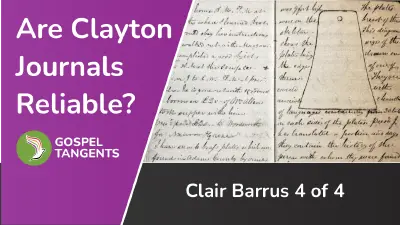May 30, 2025 · 0 min
In our final conversation with Clair Barrus, we'll discuss polygamy skeptics and William Clayton Journals. They are some of the most important pieces of contemporary evidence of polygamy, so skeptics don't like this journal. Is there evidence it was forged? Clair Barrus weighs in. We'll also discuss William & Jane Laws' accusations against Joseph Smith. Check out our conversation...
https://youtu.be/uqCbNbGazqk
Check out our conversation with Clair Barrus who wrote a chapter in Secret Covenants...
Don’t miss our other conversations with Clair: https://gospeltangents.com/people/clair-barrus/
Copyright © 2024
Gospel Tangents
All Rights Reserved
Except for book reviews, no content may be reproduced without written permission
Are William Clayton Journals Reliable?
We’re concluding our conversation with Clair Barrus, one of the authors in "Secret Covenants: New Insights into Mormon Polygamy." We’ll del into some contemporary documents to shed light on the early Nauvoo period1.
One area explored involves the relationship dynamics between Joseph and Emma Smith and William and Jane Law. The sources reveal a period of tension for Joseph and Emma regarding plural marriage, with Emma reportedly exasperated by it. Joseph himself was suspicious, asking his scribe William Clayton if Law was being "familiar" with Emma, suggesting concerns about her faithfulness. Evidence suggests Emma was interested in William Law, described by her as a "little man" she was attracted to.
According to Joseph Jackson, a suspicious character, Joseph Smith allegedly offered Emma a "spiritual husband" if she would allow him his "spiritual wives.” Jackson termed this a "wife swap.” William Law, writing much later, described the situation differently, suggesting it was compensation for Emma's difficulties with Joseph having young women living in their home. This alleged arrangement may be what is referenced in D&C 132, verses 51 and 54, where Emma is commanded not to "partake of that which I commanded you to partake of.” This passage is framed as a test or Abrahamic sacrifice. Some interpret "that which" Emma was commanded not to partake of as referring to William Law. A typescript of William Law's journal, while needing cautious use as the original holograph is unavailable, seems to allude to this story, although its trustworthiness is uncertain.
The conversation also touches upon Joseph Smith's interaction with Jane Law. William and Jane Law desired to be sealed eternally, but Joseph Smith seemed to require they accept polygamy first. Alexander Neibaur's journal recounts Joseph telling him about visiting Jane Law while William was away. According to Neibaur's account of Joseph's story, Jane expressed a desire to be sealed. Joseph claimed he couldn't tell her that her husband was an "adulterer." This highlights the context of mutual accusations of adultery between William Law and Joseph Smith. In Neibaur's account, Jane then embraced Joseph and asked if she could be sealed to him if not to her husband. Joseph claimed he gently pushed her away. However, Jane's account, as related in Neibaur’s journal, differs; she told William that Joseph had proposed to her. William Law's journal typescript also reportedly states that Joseph Smith proposed to his wife. These conflicting accounts contribute to the complex historical picture.
William Clayton's journal provides other key insights into Joseph Smith's practices and purported revelations. One interesting revelation recorded by Clayton was an "item of law" received for Clayton's benefit. This revelation stated that a man could only take two sisters from the same family, except by express revelation, because having more than two was "apt to cause wrangles and trouble." Clayton had expressed interest in marrying a third Moon sister, Lydia, after already marrying two others. Following this revelation, Joseph Smith asked Clayton if he would be okay if Joseph married Lydia Moon inste...
